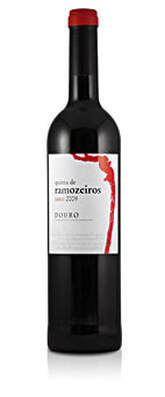The Quinta de Ramozeiros winery and family home are perched on the top of a hill in the Douro Valley, surrounded by 52 acres of vineyards. The estate has been home to vineyards since 1789. The Alves de Cunha family has lived and worked here, producing wines from native Portuguese varietals for 25 years.
The sharply sloping vineyards are terraced and sit at altitudes of 985-1,315 feet. Soils are primarily schist, which allows for deep root penetration. The slopes provide the vines with excellent sun exposures, with different plots affording different varietals uniquely suitable conditions.
The winery is committed to "...an ethical protocol of love and responsibility for the soil, the vineyards, the people, and nature as a whole." They employ sustainable farming methods that support biodiversity and the local ecosystem. In addition to native grape varietals, they cultivate olive, almond and fruit trees and a kitchen garden. This garden is used to make daily communal lunches that bring together their entire staff.
Great care is taken in the vineyard to produce grapes of the highest quality. The hand-harvested grapes are then vinified with minimal interventions, with the ultimate goal always to "...allow nature to express itself freely."
The sharply sloping vineyards are terraced and sit at altitudes of 985-1,315 feet. Soils are primarily schist, which allows for deep root penetration. The slopes provide the vines with excellent sun exposures, with different plots affording different varietals uniquely suitable conditions.
The winery is committed to "...an ethical protocol of love and responsibility for the soil, the vineyards, the people, and nature as a whole." They employ sustainable farming methods that support biodiversity and the local ecosystem. In addition to native grape varietals, they cultivate olive, almond and fruit trees and a kitchen garden. This garden is used to make daily communal lunches that bring together their entire staff.
Great care is taken in the vineyard to produce grapes of the highest quality. The hand-harvested grapes are then vinified with minimal interventions, with the ultimate goal always to "...allow nature to express itself freely."

